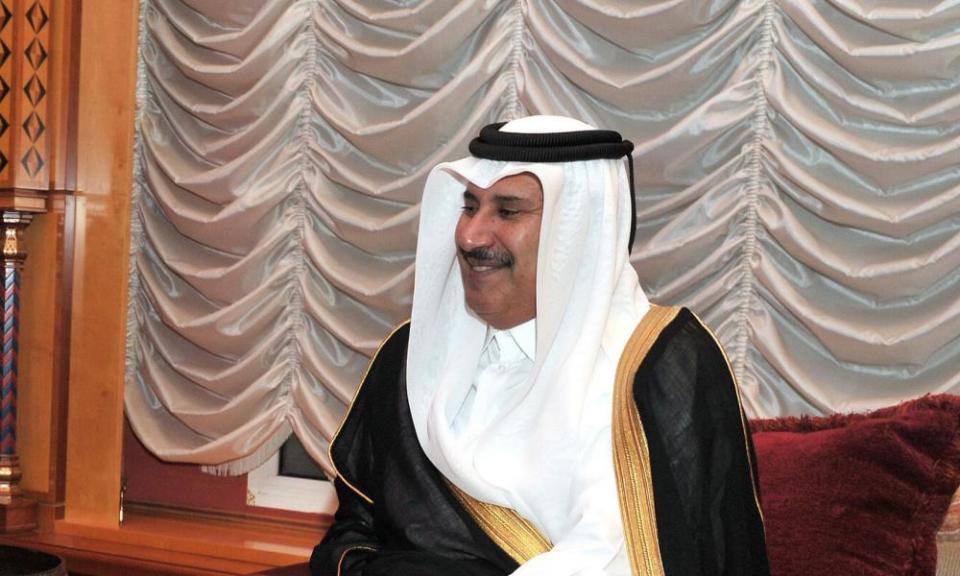‘The man who bought London’: Qatar billionaire behind Prince Charles scandal

With an estimated personal net worth of over $1.2bn (almost £1bn) according to Forbes, Sheikh Hamad bin Jassim bin Jaber al-Thani, the former prime minister of Qatar, is one of the country’s richest men – and has often garnered attention because of his wealth and is currently in the headlines over alleged cash donations to Prince Charles.
Sometimes known as “HBJ” in London’s financial circles, the 62-year-old was named the “man who bought London” after he used his wealth, as well as his influence as the head of Qatar’s multibillion dollar sovereign wealth fund, the Qatari Investment Authority, to expand Qatar’s financial assets in London through a series of valuable assets.
Related: Prince Charles given €3m in cash in bags by Qatari politician, according to report
From 2000 until 2013, al-Thani oversaw a series of high-profile investments in corporate Britain that included Harrods, the Shard (which is owned 95% by Qatar), London’s Olympic Village and Park Lane’s InterContinental hotel.
Al-Thani made a name for himself for his political prowess as well. A relative of Qatar’s ruling family, he has held several high-profile positions in Qatar’s government including minister of foreign affairs in 1992. He was appointed as Qatar’s deputy prime minister in 2003. In 2007, he became prime minister, a role he stepped down from in 2013.
In an interview with the Financial Times in 2016, he was described as an unapologetic statesman “known for his willingness to speak his mind, to swing unabashedly from one policy to another”.
Over the years, he has been central in orchestrating Qatar’s involvement in international diplomacy including in Yemen, Syria, and Israel and the Palestinian territories. Al-Thani earned the nickname “peacemaker” for his efforts to broker reconciliations between warring factions in Africa and the Middle East, according to a report by Middle East Eye in 2015.
It might come as little surprise, then, that several years ago the former emir of Qatar, Sheikh Hamad bin Khalifa al-Thani, is rumoured to have remarked that although he ran the country it was his then prime minister, HBJ, who owned it.
He also is said to have allegedly conceded that under his premiership Qatar “maybe” financed the Al- Nusra Front, the Syrian branch of al-Qaida, without his knowledge.
In 2012, Al-Thani was selected as one of the world’s 100 most influential figures by Time magazine, a decision backed by Turkey’s president, Recep Tayyip Erdoğan, who described his close friend as “a wise personality, a model leader and a man of broad vision”.
In recent years, scrutiny has swung back to al-Thani’s finances. In 2016, he was named by the Panama Papers, one of the biggest ever data leaks by the world’s fourth-biggest offshore law firm, Mossack Fonseca.
According to the International Consortium of Investigative Journalists, it was revealed that al-Thani used offshore companies to manage his superyacht moored in Mallorca, Al Mirqab, which is estimated to be worth $300m.
Qatar’s investment in Barclays during the financial crisis in 2008, when al-Thani was prime minister, became the centre of a criminal trial over the controversial services deal struck between the lender and the small Gulf state. Three former Barclays executives were accused of devising fraudulent advisory services agreements to disguise payments worth £322m to Qatar.
In 2021, al-Thani was also named in the Pandora Papers, which revealed he had used offshore companies in tax havens including the British Virgin Islands and the Bahamas.

 Yahoo Movies
Yahoo Movies 